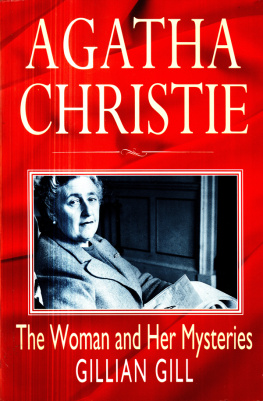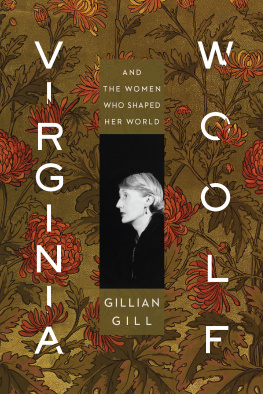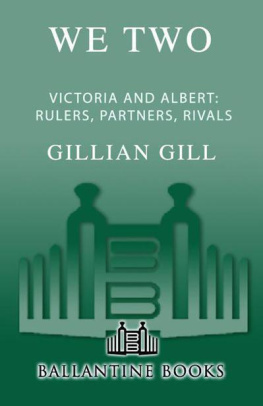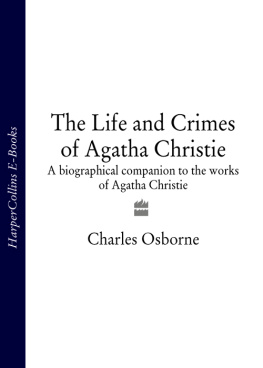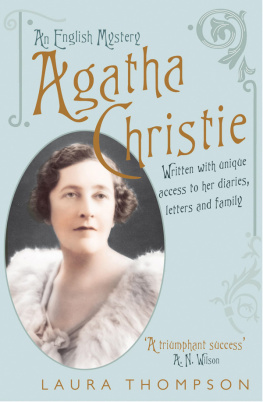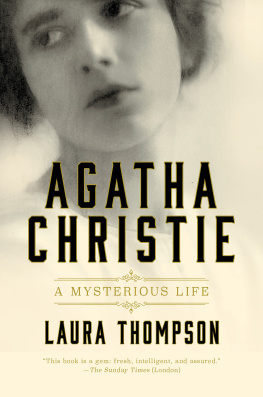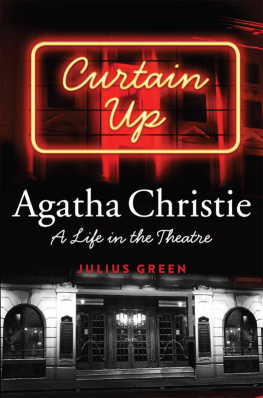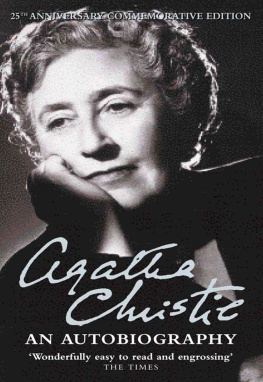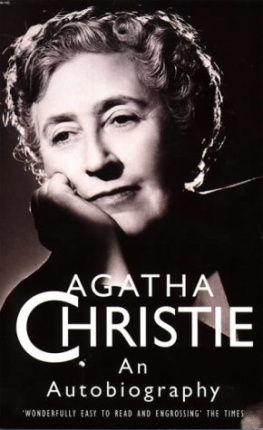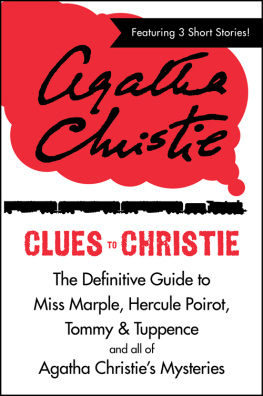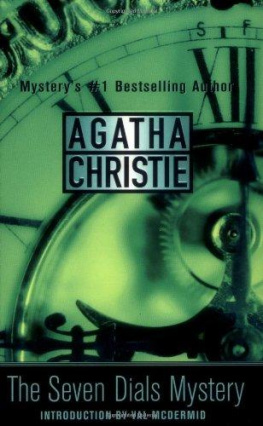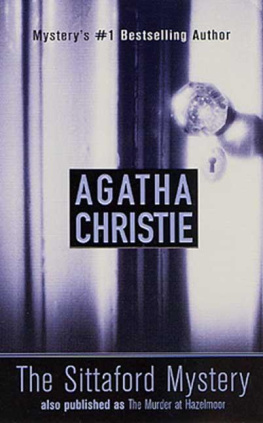Agatha Christie

Agatha Christie
The Woman and Her
Mysteries
* * *
Gillian Gill

For My Mother
Esme Scobie
and in Memory of My Grandmother
Mabel Croft
Contents
Preface
W riting tends to be a lonely business, but not when you are writing about Agatha Christie. Unlike most people who have written about Christie, I did not start out as an aficionada of the detective genre, and I first began reading Christie as part of preliminary research for a book on later British women detective writers. As it turned out, I never got any further because Christie simply won me over. In her detective works I found an unusually spacious fictional universe that spanned almost six decades and began to catch glimpses of a fascinating mind. From her autobiographical writings I developed an empathy with the woman known as Agatha Christiean empathy which is at the heart of this book.
When I had read all her published work, I was left with feelings of respect, admiration, and even affection. With her energy, her enthusiasm, and joie de vivre, her sense of comedy and good humor, her many lovesof husbands and books and ancient cultures, of architecture and music and landscapes, of tennis and bridge and crossword puzzles, of interior decoration and food and petsshe seemed the kind of person I should like to keep company with.
When I came to look at the secondary literature on Christie, another surprise awaited me. Had I taken the easy route and relied on Christies critics rather than immerse myself in the writers own work, I should probably have done no more than skim one or two of her novels that were featured in the many best detective fiction of all time lists. I should certainly not have got any sense of what Agatha Christie was like as a person. Even the critics who claimed admiration for her fiction could barely stifle a yawn when discussing Christies life and personality. Only one event in Christies lifeher eleven-day disappearance in 1926ever caught the publics attention. Christie possibly dead by her own hand or anothers, Christie amnesiac, Christie enacting a hysterical fuguethis was the woman the public wished to find. Yet as all the ample biographical information now available about Christie proves,this woman than the disappearance. Christie was to spend the rest of her life endeavoring to live down the reputation she had earned in 1926. Whereas the events linked to the disappearance connote passion, despair, failure, betrayal, madness, Christies life as a whole is a model of equanimity, happiness, success, control, and sanity.
Everyone writing on Christie, whether friend or foe, agrees that she is very famous indeed, the most famous woman writer ever, perhaps the most famous writer, period!
It is claimed on good authority that Agatha Christie has sold more copies and earned more in royalties than any other writer. The author of seventy-eight crime novels, approximately 150 short stories, six straight novels, four nonfiction books, and 19 plays, she is estimated to have sold 2 billion copies in 104 languages, outselling even William Shakespeare. The annual earnings of Agatha Christie Ltd. (the trust set up in 1955 and owned partly by Booker plc and partly by the daughter, grandson, and great-grandchildren of the author) were reported by the Daily Telegraph of September 16, 1989 as two and one-half million pounds. In April 1989, paperback rights to thirty-three of Christies works until the year 2000 were acquired by Harper & Row for $9.6 million. Agatha Christie Ltd. refuses to even try to calculate total Christie earnings since the first book. Agatha Christies most famous play, The Mousetrap, has been seen by seven and one-half million people since it opened in November 1952, and its box-office takings amount to 14 million pounds. Virtually everything Agatha Christie wrote is still in print in English, and television and film versions of her novels and stories have recently created a new generation of fans all over the world.
There is agreement that she was extremely successful during her long lifetime, ending her days as Dame Agatha, chatelaine of the beautiful Georgian estate of Greenway in Devon as well as of lesser properties, martyr to the British tax system, matriarch of a burgeoning and prosperous family. It turns out, however, to be Christies very success that has made her uninteresting to critics. A woman writer who fails to go mad, have interesting lovers, bear illegitimate children, commit suicide, or die in poverty is simply no fun. It is Christies relentless productivity over almost sixty years, her accelerating sales and ever-increasing fame, her personal inviolability to misfortune and disaster, that have made her so unrewarding a biographical subject.
It is perhaps only in the light shed by recent work on womens lives and by current ideas of womens writing that a coherent account At the same time, her life and career offer rousing evidence that it may indeed be possible for a woman of talent to have fame, fortune, and happiness, books and babies, to marry her personal ideal of happiness with the worlds idea of success.
* * *
Many people helped in the writing of this book. The Alliance of Independent Scholars provided me with a writers support group that has been of great importance; Margaret Storch, Polly Kaufman, Jean Herbert, and Grace Vicary, to name only a few, were always enthusiastic, encouraging, and knowledgeable. Nadya Aisenberg was my most careful and demanding reader in the early stages, and she and Mona Harrington, both of the Alliance, gave me practical advice as well as theoretical insights. My old friends Ellen Peel, Margaret Ittelson, Christopher Lenney, and Willem Malkus read different chapters, offered suggestions from very different perspectives, and urged me, above all, to keep going. My editor, Joyce Seltzer, has been the soul of tact and cooperation from the outset, always able to see the wood for the trees and holding me to her own high standards of writing. The final shape of the book and the tone of the writing owe much to her influence. My husband, Mike Gill, has been enthusiastic about my Christie project from the start. He has not only encouraged me, and zealously read every page of the manuscript, but served as my computer consultant and word-processing instructor. This book could not have been written without him. I should like to thank my mother-in-law Dorothy L. Gill for her zealous search for Christie photographs, as well as Raymond and Margot Gill who provided me with some valuable information. Above all, my gratitude and affection go to my parents, Esme and William Scobie, who made incisive comments on my early draft, scoured book sales and the shelves of friends for copies of Christies work, Xeroxed articles, sent off parcels, set up BBC Radio interviews, and generally acted as a combination of unpaid research assistants and public relations experts. Agatha Christie has proved a wonderful link between my American present and my British roots.
Introduction
The Hidden Author
T HE cultural legacy of Agatha Christie, the originality and brilliance of her craft, the importance of her message, as well as the meaning of her life, are subtly undervalued. Christie has won enormous fame but has never had the reputation for intellectual chic enjoyed by other detective fiction writers of her generation such as Chandler, Hammett, and Sayers. Ironically, Christies low standing in the annals of culture is in part her own work, an outcome of her consistent and successful strategy of concentrating the readers attention upon her fictional characters and plots while she herself remains silent, masked, unnoticed, the hidden author.

